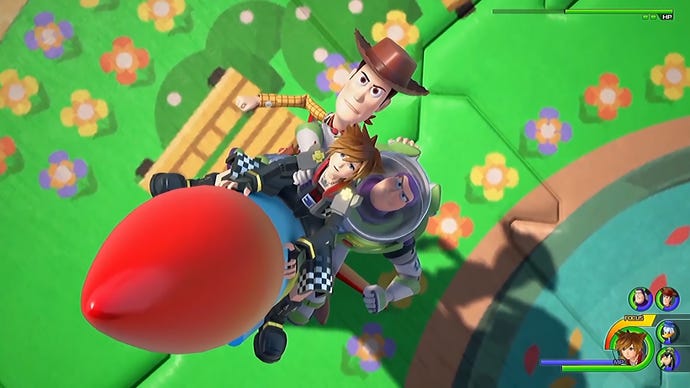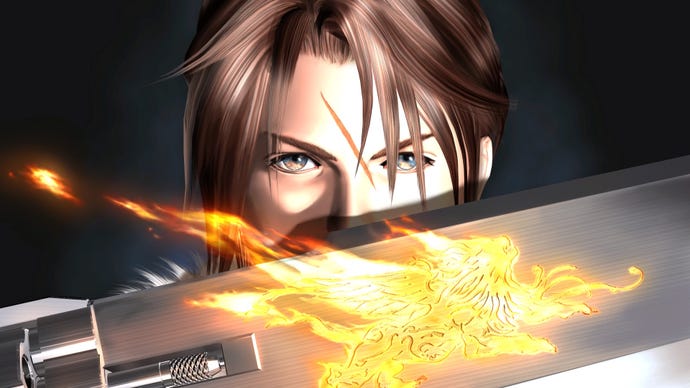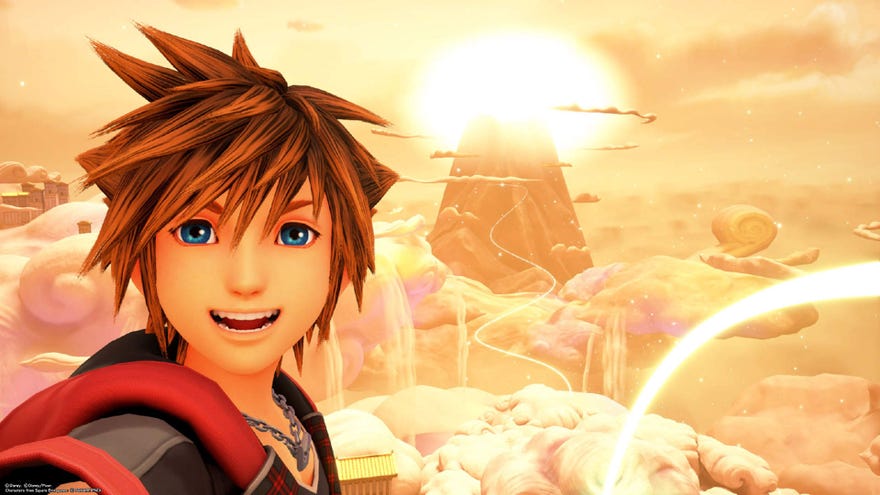Kingdom Hearts reveals all the ways Square Enix are trapped by their own history
A goofy series...?
Kingdom Hearts straddles two eras in Square Enix history. It was conceived in 2000, in what was arguably the apex of the company’s influence. It was a period when a company like Square might think, “Disney would gladly let us put their best characters in our games.” Legend has it that started as a literal elevator pitch, with a chance meeting between Square Enix producer Shinji Hashimoto and a Disney executive sowing the seeds for a crossover series that would span two decades and nearly a dozen entries, and next week is coming to PC for the first time.
It’s a release that’s apt to inspire equal parts excitement and bemused laughter among PC fans. Excitement because Mickey, Donald, and Goofy in 4K is pretty neat; bemused laughter because Kingdom Hearts is just that weird. If director Tetsuya Nomura has a bit of a reputation in RPG circles, it’s because Kingdom Hearts absolutely glories in every Nomura cliche imaginable: nonsensical naming conventions, wild psychodrama, and belts, belts, belts (and zippers).
It has cultivated a dedicated fanbase over the years, encompassing a broad cross-section of Disney fans, anime fans, and those who just enjoy seeing Final Fantasy VII’s Cloud Strife battling Sephiroth in Hercules’ Coliseum. More than a few are 20-somethings who grew up with the series, attracted by the combination of Disney animation and easily accessible combat. It’s a fandom that at times matches the mania of the Lost and Game Of Thrones communities at their peaks. In the run-up to the release of Kingdom Hearts III in 2019, the community eagerly consumed trailers and tossed around detailed theories about what was actually happening. YouTuber ProZD captured the dynamic rather well.
But for all the passion surrounding the franchise, PV owners playing Kingdom Hearts for the first time will find a series that very much reflects “modern Square Enix” — the period following Square’s disastrous turn as a movie studio and subsequent merger with Enix. The Square Enix of the 2000s were a bigger, more mature company than they were in their 90s heyday, but also more bloated. It was right around Kingdom Hearts’ release that then-CEO Yoichi Wada decided it was time to lean as heavily as possible on the company’s existing properties, leading to a whole new world of sequels, spinoffs, and movies under banners like "Fabula Nova Crystallis."
"Kingdom Hearts was one of Square Enix’s few bright spots during the 2000s, and later spin-offs managed to keep the momentum going."
It wasn’t a particularly happy time for Square Enix. Where they had been machine-like in the 90s, cranking out multiple Final Fantasy releases in the span of just a few years, they slowed to a crawl in the 2000s. Final Fantasy XII ran into problems when director Yasumi Matsuno unexpectedly departed the project. Final Fantasy Versus XIII spent years in development hell. The purchase and subsequent rebranding of Eidos Interactive in an effort to break into the western market brought with it some modest successes (the Tomb Raider reboot) and some major letdowns (Avengers).
Kingdom Hearts was one of Square Enix’s few bright spots during this period. The sequel was a major critical and commercial hit when it arrived in 2006, and later spin-offs managed to keep the momentum going to some degree. But as the wait for Kingdom Hearts III dragged into the mid-2010s, even avowed fans found reason to grumble amid a steady stream of side-stories, re-releases, and teasers.
When Kingdom Hearts III finally did arrive in early 2019, it mainly opted to stick with what worked. More than a few reviewers described it as a game straight out 2006, replete with lengthy cutscenes laden with heavy-handed exposition. Still, its core strengths remained intact. Its ode to Toy Story was one of several pitch-perfect moments that finally made good on the old promise of a game that looked like a fully-interactive Pixar film. The hack-and-slash combat was more welcoming than Square Enix’s frequently esoteric turn-based fare, if not nearly as deep. Its soundtrack, featuring tunes from Yoko Shimomura and Hikaru Utada, was memorable enough to warrant its own rhythm game (also coming to Steam).

Those strengths have carried Kingdom Hearts for a very long time now, and they should translate readily to PC. With those strengths, though, will come its familiar weaknesses. Specifically, try as it might, Kingdom Hearts has never quite been able to escape the entropy of nostalgia. The broad consensus is that its original elements — Organization XIII, the Heartless, Xehanort — are one big and very complicated mountain of nonsense that only distracts from the Disney nostalgia fest at the heart of the series. I tend to agree with the critics — I mentally checked out on the story right around when Roxas showed up in Kingdom Hearts 2 — but I also feel some sympathy for Nomura and writer Kazushige Nojima. More than anything they seem to want to make the series their own, away from crushing weight of Disney’s IP enforcement.
In the lead-up to Kingdom Hearts III’s release, Nomura complained often about the restrictive oversight that came with working on franchises like Monster’s Inc. and Frozen. “[N]ow that it's become a bigger title, a lot more people have been involved than before,” Nomura told me at in interview during E3 2018. “In that sense the relationship with Disney has changed quite a bit. [...] I don't really know if there has been any changes emotionally for me. But at least physically I can say those were the changes that we had with Disney.”
His reaction has been to make Kingdom Hearts as wild as possible — the crazier the better. A friend of mine sometimes jokes that she will keep escalating everything she does just to see how long she can go before people realise that she’s not bluffing. As the Kingdom Hearts III epilogue memorably showed, no one has called Nomura's bluff.

Kingdom Hearts isn’t the only Square Enix series trying to escape the entropy of nostalgia. Final Fantasy VII Remake, which is still a console exclusive but figures to be out on PC at some point in the nearish future, is another Nomura project that explicitly rebels against the burden of nostalgia. It’s easy to imagine him telling fans between cigarette drags, “Let the past die. Kill it, if you have to.”
Indeed, Square Enix as a whole often seem imprisoned by their past. No matter how much they would rather be seen as modern purveyors of blockbuster gaming, their best-loved releases are inevitably games like Dragon Quest XI that uncritically wallow in the past (while admittedly being very good). Kingdom Hearts embodies that conflict more than most.
Kingdom Hearts is kind of a nostalgia piece itself these days. Even with the benefits of mods and 4K graphics, it’s still a series that’s fundamentally stuck in the 2000s in terms of story, design, and fashion. Barring a major revamp for Kingdom Hearts 4, it’s apt to always feel like a series better-suited for the PlayStation 2 than modern PCs. The same can be said for Square Enix, much as it would prefer to be seen as in the same league as Activision-Blizzard or Ubisoft. Both continue to be reasonably successful to this day, but the bright dreams that accompanied the series’ conception have dimmed. Until Square Enix figures out how to deal with its own history, they’re apt to remain that way.


